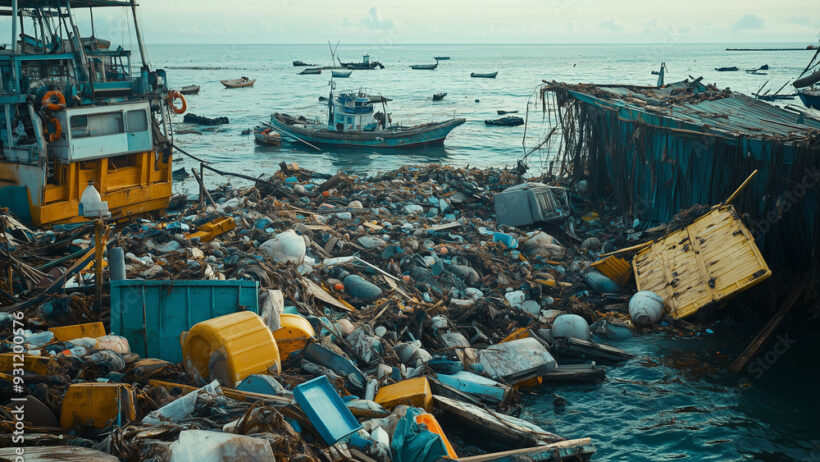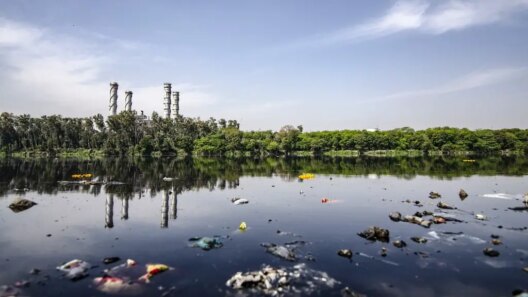As the world grapples with the escalating consequences of climate change, the focus on ocean health has intensified, leading to heightened scrutiny of pollution, particularly debris in the water. The critical question arises: can trash in the ocean actually contribute to global warming? While plastic waste and other forms of garbage may not directly increase greenhouse gas emissions, their deleterious impacts on marine ecosystems and the greater environment signal an urgent connection that warrants exploration.
First, it is essential to define the various types of waste that plague our oceans. Plastics constitute the most prevalent form of marine debris, with various categories such as microplastics, macroplastics, and abandoned fishing gear. Each of these pollutants presents unique challenges to marine life. Microplastics, for instance, are tiny plastic particles that result from the fragmentation of larger plastics or are manufactured as small pellets for industrial use. Macroplastics, on the other hand, include items like bottles, bags, and straws. In addition, abandoned fishing gear, also known as ‘ghost gear’, continues to ensnare marine organisms, causing untold suffering and contributing to biodiversity loss.
Moreover, plastic waste often contains toxic substances that may leach into marine environments, disrupting the delicate balance of ecosystems. Many ocean species, including fish that are crucial for human consumption, risk being impacted by these toxins—which may ultimately find their way back into the human food chain. This introduces a significant health risk, wherein humans consume contaminated seafood, leading to bioaccumulation of hazardous chemicals within their own bodies over time.
Another angle to consider is the impact of marine debris on marine organisms. Research shows that entanglement in plastic waste can lead to physical injury and death for countless species. Sea turtles confuse plastic bags with jellyfish, leading to ingestion that can cause internal blockages or infections. Such mortality can disrupt food webs and alter species interactions, with far-reaching implications for ecological stability. The loss of keystone species, such as certain fish or marine mammals, could lead to increased algae growth, fewer reef-building corals, and ultimately, a less resilient ocean ecosystem. A degraded ocean is unable to sequester carbon efficiently, thereby exacerbating the very phenomenon of global warming.
Furthermore, it’s important to acknowledge how plastic pollution exacerbates climate change indirectly. Producing and incinerating plastic releases greenhouse gases, contributing to global warming. Plastic is derived from fossil fuels, and the extraction and processing of these resources entail significant carbon emissions. Moreover, once in the ocean, plastics can break down into smaller particles, becoming microplastics that may further affect marine life and biodiversity. The interplay between our reliance on plastic and fossil fuels compounds the climate situation. As the disparity of global temperature continues to rise, its estimated impact is a substantially compromised and increasingly unstable marine ecosystem.
Another noteworthy aspect to consider is the connection between ocean trash and carbon cycling. Healthy oceans play a critical role in absorbing carbon dioxide, acting as a vital buffer against climate change. However, pollution impacts microbial processes and phytoplankton, which are essential for carbon sequestration. When marine environments are polluted, the productivity of these organisms diminishes. This leads to less carbon being removed from the atmosphere, contributing to the greenhouse effect that drives global warming.
The efforts to mitigate these impacts can begin with a deeper understanding of the significance of circular economies and recycling initiatives. Engaging in practices that promote waste reduction—such as sustainable packaging—can significantly lessen the flux of plastic into oceans. Additionally, public awareness campaigns and educational programs can be crucial in fostering a culture of environmental sensitivity, pushing consumers to rethink their choices. Community-driven beach clean-ups and organization of recycling events can directly reduce waste in marine environments while also empowering individuals to participate actively in their local ecosystems. These are positive steps toward addressing the implications of pollution.
Legislation also plays a vital role in this discourse. Implementing and enforcing stricter regulations on plastic manufacturing, usage, and disposal could drastically cut down the amount of aquatic debris. Policies aimed at reducing single-use plastics in favor of sustainable alternatives have already shown promise in many regions. While this is a vital component of addressing plastic pollution, it must be coupled with global cooperation on waterway protection and sustainable fishing practices. Cooperation between countries can help create international standards, ultimately leading to better management of waste, protection of habitats, and reduction in overall emissions.
In conclusion, while trash in our oceans may not be the sole driver of global warming, it exacerbates existing environmental challenges and reflects our collective negligence towards marine ecosystems. The multifaceted relationship between ocean trash and climate change necessitates urgent action on multiple fronts, from personal responsibility to systemic reform. Although the path is fraught with challenges, embracing sustainable practices, enforcing legislation, and fostering awareness may hold the key to mitigating the tangible impacts of marine pollution on global climate. Ultimately, preserving the health of our oceans is inextricably linked to the fight against climate change, requiring collective endeavor and unwavering commitment from all sectors of society.








